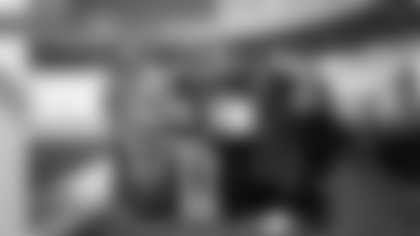On the left side of the Green Bay defense for the Vince Lombardi teams were end Willie Davis and cornerback Herb Adderley, both of whom would be inducted into the Pro Football Hall of Fame after their careers. The defender who filled the gap between the two is Dave Robinson, considered one of the greatest linebackers of his era, but not reunited with Davis and Adderley in Canton.
While less-heralded in the history books, the Hall of Fame did name Robinson to the All-Decade team for the 1960s, and he was an integral part of three championship clubs. He was a three-time All-Pro and was also voted to the Pro Bowl for three seasons. The first-round pick in '63 would play in 127 games before departing in '73 and having two more quality seasons for the Redskins.
Robinson was extremely productive during his stint in Green Bay, with 21 interceptions for 322 yards in returns, but it wasn't only the plays he made, but when he made them. He was the consummate big-game performer, and with his flair for rising to the occasion, his feats became legendary.
In '66 at Baltimore, Davis stripped Johnny Unitas deep in Packers territory and recovered the fumble, ending a late drive in a 14-10 victory that clinched the division title. A few weeks later in the NFL Championship, with the Packers clinging to a 34-27 lead, Dallas faced fourth-and-goal from the Green Bay 2. Robinson drilled QB Don Meredith as he hurriedly threw the ball, and it was easily intercepted by Tom Brown in the end zone.
Lombardi famously graded Robinson out as a minus-2 for his failure to cover the run before charging after Meredith. According to the linebacker, Dallas coach Tom Landry hadn't called that play for months, but Robinson had it read correctly and abandoned the normal run-first responsibility.
"If we don't win that game, and if we don't make that play, Dallas might have gone on to beat Kansas City and the Super Bowl trophy could be the Landry Trophy instead of the Lombardi Trophy. I think Lombardi has a better ring to it," Robinson said with a laugh. "When I hit Meredith, he threw a wounded duck. I got a minus instead of a plus on the biggest play of the game, but I knew what was going to happen and that I had to stop it no matter what.
"For both Baltimore and Dallas, I was there in the last minute, and I know I was a big part of the biggest plays of two big games. I also made an interception in '65 against Baltimore. Those were three big plays. So those are good memories."
Against the Colts late in the '65 season and the Packers ahead, 14-13, Robinson deflected a pass late in the second quarter, plucked it out of the air and raced 87 yards before being dragged down. The play sparked Green Bay to a 42-27 win. Both teams ended 10-3-1 and the NFL Western Conference Championship vs. Baltimore was held at Lambeau Field. The Packers won in overtime, 13-10.
Today, Robinson lives in Akron, Ohio, and is retired after working for two decades with a distributorship for Schlitz Beer. Robinson reflects on his career fondly, including being part of a Packers linebacker corps that is considered among the best in NFL history. He, middle linebacker Ray Nitschke and outside linebacker Lee Roy Caffey patrolled the second level of the defense with authority.
"We worked really well together," Robinson said. "One of my jobs, and it wasn't in the playbook but it's what he told me when I arrived, was to keep the tight ends from cracking down on Willie Davis. So that's what I did. It wasn't like today. The tight end never came off clean. I went against Mike Ditka, Charlie Sanders and John Mackey every year, and they're all in the Hall of Fame. Willie especially didn't like Ditka cracking down on him, but I didn't let anyone off the ball."
Robinson went through the rest of his progression on the left side during a typical passing play.
"My next look was to the running back, and then to the flanker. After about 10 or 15 yards, Herb would jump on him. We worked very closely on the left side. In those days, quarterbacks all called their own plays, and almost all of them were right-handed, looking left. So they ran a lot of plays our way," Robinson said.
Robinson was drafted 14th overall out of Penn State, where he played defensive end as a senior and was an All-American. As a sophomore he played offensive guard and nose guard for the Nittany Lions, and as a freshman he played as a 200-pound offensive tackle, the only time in his career he went into every game knowing he was going to get pushed around on a football field.
His first contact with the Packers came in the '63 College All-Star game in Chicago, when Green Bay defensive coordinator Phil Bengston suggested Robinson's future in the NFL may be at linebacker. As a rookie, Robinson was the fourth or "swing" linebacker, most often filling in on the right side.
Lombardi was in the hunt for a third straight NFL Championship, but the Packers would fall short, even at 11-2-1.
Robinson wouldn't become a full-time starter until '65, when the club traded starter Dan Currie to Los Angeles. Robinson settled in behind Davis, a three-time All-Pro already. Helped by a defense that would allow an average of 14.2 points over the 42-game span, the Packers would get the three consecutive NFL titles that Lombardi craved from '65-67.
"It was like sitting in a rocking chair playing behind Willie," Robinson said. "I was right at home. I was extremely pleased."
Of course, with his range and awareness, Robinson also helped make Davis and Adderley into future Hall of Famers. At 6-3, 245, with long arms and the quickness to trail wide receivers before passing them off, Robinson is the rare player from a bygone era in the NFL with the physical dimensions and ability to still excel in the speed and demands of today's game.
After his years in Green Bay, Robinson had a two-year stint in Washington after being traded for a second-round pick. In Washington he played for another Hall of Fame coach, George Allen. He started all 28 games he played for the Redskins, and in '73 tied his career-high with four interceptions and recovered a pair of fumbles.
True to form, Robinson had a hand in a teammate shining. Redskins' linebacker Chris Hanburger was a first-team All-Pro both years Robinson was in Washington and will be inducted into the Hall of Fame in August.
"I had a couple of good years there. After the '74 season, I could still play, but I was 34 and Schlitz wanted an answer because they had a position for me. George asked me to be an assistant coach, but I took the job with Schlitz full-time. Around that age is when most players retire, so that's what I did," Robinson said. "I had been working all along in the offseason during my career, and it seemed like it was time to start doing that full-time. I had three boys at home eating."
Ask Robinson about his exclusion from the Hall and there's regret. It doesn't run bitter. He's thrilled for Adderley, who was inducted in '80, and Davis, who entered the Hall in '81. According to the Hall of Fame Robinson has been nominated but never a finalist in a vote, but the linebacker largely judges his career by the championship teams he was a part of.
Some believe his exclusion is largely because there are so many players from the Lombardi teams in Canton – 10, as well as the legendary coach – that voters are reluctant to add another. Jerry Kramer may be suffering the same fate.
"I don't think it's a valid reason, because you judge the individual," Robinson said. "It was a collection of great players, and a great coach. That's how you end up winning championships. That's how you end up winning a few of them together. The same as the Steelers, the same as the 49ers, the same as the Cowboys were. Great teams that win have great players."
The main reason he would have liked to have his bust in Canton is personal. His wife, Elaine, died May 11, 2007, and being inducted would have meant more when she was alive than it does now.
"I had a Hall of Fame wife, and I would have liked to have been voted in for her to have seen it. The hardest job in football is to be married to a player. We were together for 50 years, starting as high school sweethearts, so I felt like I owed it to her to be voted into the Hall of Fame," Robinson said.
It's been a difficult few years since Elaine passed. Robinson's son, Richard, died at 43 of a heart attack a few months after his mother had passed. Robinson's youngest son, Robert, died of kidney failure at 34 in 2001. Robinson lives with his son, David, Richard's twin, who works in the medical supply business. David played on the 1982 National Championship team at Penn State as a safety.
Robinson comes up to two or three games a year in Green Bay, and typically makes the trek from Akron to Detroit when the Packers play the Lions. When he looks back on his career, despite still waiting for the call from the Hall of Fame, he's pleased with the championship years the Packers put on the façade at Lambeau Field and his contributions to the left side of the defense.
"It could have been a heck of a lot worse," he said.
For a listing of more 'Where are they now?' stories on packers.com, click here.














